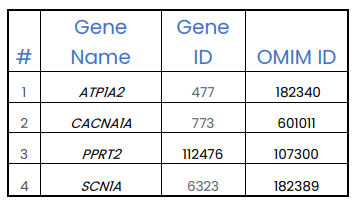Familial hemiplegic migraine
Familial hemiplegic migraine (FHM) is a rare subtype of migraine with an aura including fully reversible motor weakness, visual disturbance, sensory loss, and dysphasia. These neurological symptoms may last a few hours or several days.
Hereditary FHM is generally caused by mutations in the ATP1A2, CACNA1A, or SCN1A genes, inherited in an autosomal dominant manner. Based on the inheritance pattern, most individuals diagnosed with FHM have an affected parent.
Genetic testing for these genes can be used to confirm the diagnosis for FHM which may be very useful in precision medicine.
we offer screening solutions for these genes involved in FHM.
Panel content
we offer screening solution for the gene mutations involved in familial hemiplegic migraine with a panel consisting of 4 genes. The genes are based on clinical evidence, scientific publications, Human Gene Mutation Database (HGMD), and Online Mendelian Inheritance in Men (OMIM).

Analysis technique
Familial Hemiplegic Migraine Panel is performed using Next Generation Sequencing (NGS), an advanced technique that offers deep, large-scale deciphering of the genome. The technique has revolutionized genetics by enabling different approaches for high-throughput, scalable sequencing.
Bioinformatics
Panels may include both coding, non-coding, and regulatory regions of the genome, sequenced to a minimum depth of 20. Any coding regions are analyzed +/- 10 base pairs from the exon-intron boundary.
The data is analyzed and annotated with our state-of-the-art in-house developed computational pipeline, integrating high-tech machine learning algorithms with industry-standard software solutions to deliver the most comprehensive data analysis. Throughout the workflow, rigorous quality control steps ensure consistent, valid, and accurate results. A plethora of professional, curated databases are integrated into our pipeline, including, but not limited to, gnomAD, ClinVar, Omim, HGMD, RefSeq, and DBSNP, ensuring high confidence variant classifications. Furthermore, several prediction tools are integrated into the variant classification, such as SIFT, PolyPhen, MutationTaster, AION, SpliceFinder, etc. All quality assessment metrics are available upon request. In case of failure to acquire data from specific genomic target regions within a panel, you will be notified.
Sample requirement
- Blood (2-5 ml EDTA-blood)
- DNA (minimum 3 µg)
- Saliva (minimum 2mL)
Test specifications
The test is performed as data extract (virtual targeted panel) from whole exome data.
Chemistry: Twist Biosystems Human Core Exome
Hardware: Illumina Novaseq 6000 Sequencer
Data processing: An in-house bioinformatics pipeline performs variable calling and filtering calling.
Metrics: Average read depth >100-fold. On target coverage,>97% at a >20-fold read depth.